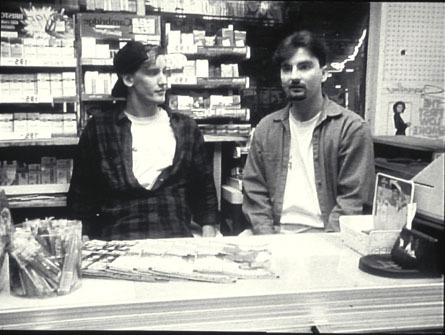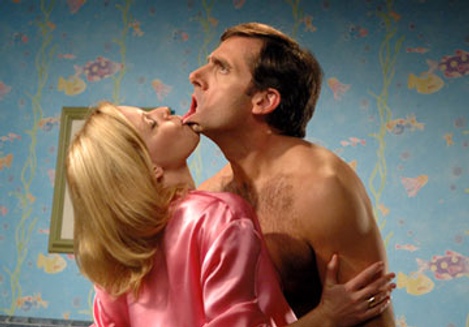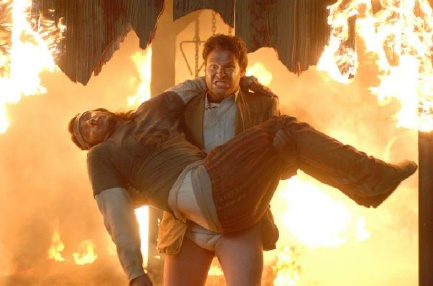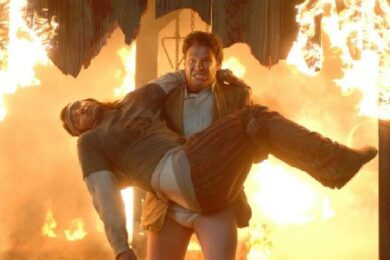The unmistakable scent of the beta male currently hangs over Hollywood: that pungent aroma of ripe B.O., stale hashish and semen-encrusted tissue making tinsel town smell like a teenage boy’s bedroom. Improbable as it all sounds, the uber-nerd slackers with the unhealthy porn obsession and an attitude to personal hygiene which might charitably be described as laissez-faire are busy re-defining the conventions of the male romantic lead. For evidence, look no further than this autumn’s release schedule: Pineapple Express, How to Lose Friends and Alienate People, Sex Drive, Choke, Zach and Miri Make A Porno, these are all films characterised by their male leads behaving badly and not only getting away with it, but walking off with the girl to boot. The slobbish, immature, emotionally-stunted, sex-crazed male is very much in the ascendancy, and there’s nothing anyone can do about it.
It wasn’t always thus. Once upon a time in Hollywood, the beta male knew his place. An object of pity and general derision, he would invariably play second fiddle to his chisel-jawed, contact sport-loving, all-American alpha male peers. What romantically frustrated adolescent male couldn’t relate to Duckie in John Hughes’ brat pack classic Pretty in Pink as he moped in his bedroom, nonchalantly flicking playing cards into the bin as Morrissey pleaded “please, please, please let me get what I want” in the background? What Duckie wanted was Molly Ringwald, and we knew that his cause was hopeless, a lifetime’s worth of bitter tears and solitary masturbation his only meagre consolation. Very occasionally (The Revenge of the Nerds, Weird Science) the sex-starved nerds would take centre stage and actually get some action, but there was tacit acknowledgment from the viewer that this was just outlandish male wish fulfillment run rampant, the stuff of cable porn fantasy.

Then, something changed: a generation of beta male directors rose to prominence and decided to metaphorically piss all over the rule book, celebrating the unreconstructed male in all his boorish glory. Firstly, there was Kevin Smith, whose no-budget 1994 slacker comedy Clerks ingeniously tapped into that instantly-recognisable strain of Y-chromosome geekdom. There was nothing refined, hip or remotely debonair about his convenience store anti-heroes Dante and Randal, who not only acknowledged their limited prospects and beta male status, but seemed to positively revel in it, filling the emotional void with crude sexual put-downs and trivia-fixated banter.
With cheery serendipity, Clerks word-of-mouth success coincided with the rise of the archetypal video store geek, Quentin Tarantino, whose obsessive pop culture referencing and smash-and-grab pillaging of the cult movies of his (misspent) youth made him the hottest property in Hollywood. To paraphrase Huey Lewis and the News, it was suddenly hip to be square.
Smith continued to reap comic reward from his seemingly inexhaustible well of male inadequacy in hits such as Mallrats, Chasing Amy and Jay and Silent Bob Strike Back, albeit with diminishing returns. By the time of his lukewarmly-received Clerks sequel in 2006, however, a usurper by the name of Judd Apatow had assumed his mantle as pre-eminent champion of the beta male.

Together with long-term collaborators Evan Goldberg and Seth Rogen, Apatow hit upon a winning and highly lucrative combination of coarse humour and goofy sentimentality. 2005 sleeper hit The 40-Year-Old Virgin established the formula, realising the rich comic potential in the sexual travails of the beta male, as goading work colleagues sought to transform Steve Carrell’s virginal loser into an unlikely lothario. Similar themes were subsequently revisited and expanded upon in a string of critically-acclaimed hits: Superbad chronicled the exploits of horny high-school losers embarking on a seemingly doomed mission to get laid; in Knocked Up Seth Rogen’s oafish protagonist improbably manages to first impregnate and than melt the heart of prim, sophisticated Katherine Heigl; recent efforts Forgetting Sarah Marshall and Pineapple Express continued the tradition of flawed but essentially likeable beta male losers punching way above their weight in the romance department.

Not that the runaway success and ubiquity of team Apatow has been met with universal approval. Heigl herself sparked frenzied debate last year when she admitted in a Vanity Fair interview that she found Knocked Up “a little sexist”, claiming that it "paints the women as shrews, as humourless and uptight, and it paints the men as lovable, goofy, fun-loving guys”. By any objective reading, it’s hard to dispute this contention. But, for my money at least, accusations of misogyny are wide of the mark. Knocked Up and similar efforts from the Apatow stable represent nothing more complex or sinister than exercises in beta male wish fulfilment, the revenge of the nerd after years of neglect and ritual humiliation by Hollywood. In this alternative reality, smart, beautiful women are drawn to the bumbling charms and bawdy humour of socially awkward, unconventionally attractive men ahead of the guile, erudition and brawn of more obviously eligible candidates. This holds an obvious aspirational appeal to a male audience, who can help assuage memories of their own romantic disappointments by rooting for the plucky underdog in his efforts to bag the girl in spite of his manifold deficiencies. The appeal to women is more difficult to discern: could it be that female audiences are simply bored rigid by the patronising and two-dimensional representations of male desirability as foisted upon them by assembly-line romcoms, and crave slightly more realistic romantic leads? Then again, maybe that’s simply indulging in a spot of wish fulfilment of my own.
Read our review of Heavy Metal In Baghdad here and check out our top ten metal films.



